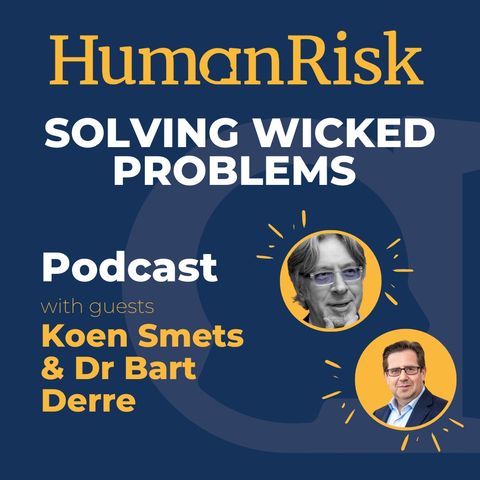Koen Smets & Dr Bart Derre on Solving Wicked Problems

Descarga y escucha en cualquier lugar
Descarga tus episodios favoritos y disfrútalos, ¡dondequiera que estés! Regístrate o inicia sesión ahora para acceder a la escucha sin conexión.
Descripción
How can we solve 'wicked problems' within complex organisations? A wicked problem is a social or cultural problem that's difficult or impossible to solve because of its complex and interconnected...
mostra másIf that sounds like a big challenge, it is. But it's precisely the kind of thing my guests on this episode, Koen Smets & Dr Bart Derre relish. By using innovative methods, Koen and Bart try to bring behavioural change to the organisations they work with.
On the episode, delve into their unique approach that combines design science research, self-regulated learning, and data-driven methodologies to tackle complex challenges.
Bart and Koen share their experiences and insights on the importance of context, the role of leadership in training, and the dynamics of compliance versus entrepreneurial behaviour. You'll hear about self-regulated learning and the experimental nature of their work.
Koen Smets is a behavioural economist and consultant who teaches at St. Louis University. He's best known for his online moniker Koenfucius, where he blogs about all things behavioural.
Dr Bart Derre is is the Director of the Center for Entrepreneurship at the University of Applied Science in Ghent. Together, they have co-authored a book on entrepreneurial behaviour and founded the consultancy firm, The Bee.
Links:
The Bee Consultancy - https://www.dercon.be/team
Koen on LinkedIn - https://www.linkedin.com/in/koensmets/
Koen's blog - https://koenfucius.wordpress.com/
Koen on Twitter - https://twitter.com/koenfucius
Bart on LinkedIn - https://www.linkedin.com/in/bartderre/
Timestamped Summary (AI generated)
- [00:01:00] Introducing the guests: Koen Smets and Dr. Bart Dero.
- [00:02:00] Background on Koen and Bart's expertise in behavioural science and their unique insights.
- [00:04:00] Discussion on their entrepreneurial organization and approach to behavioural change.
- [00:06:00] Explanation of self-regulated learning and its significance.
- [00:08:00] Tackling compliance challenges using behavioural science.
- [00:10:00] Real-world applications and case studies of their methodologies.
- [00:12:00] The role of leadership in implementing and supporting behavioural change.
- [00:14:00] Balancing organizational goals with regulatory requirements.
- [00:16:00] Examples of key behavioural indicators (KBIs) versus key performance indicators (KPIs).
- [00:20:00] Insights into creating a safe environment for self-regulated learning.
- [00:22:00] Discussion on the importance of feedback loops and continuous improvement.
- [00:24:00] The need for trust and psychological safety within organizations.
- [00:28:00] Addressing challenges in regulated industries and the importance of flexible compliance.
- [00:32:00] The significance of qualitative data in understanding and improving behaviours.
- [00:36:00] The impact of organizational structures on behaviour and performance.
- [00:40:00] Encouraging innovation and creativity within structured environments.
Información
| Autor | Human Risk |
| Organización | Human Risk |
| Página web | - |
| Etiquetas |
Copyright 2024 - Spreaker Inc. an iHeartMedia Company
